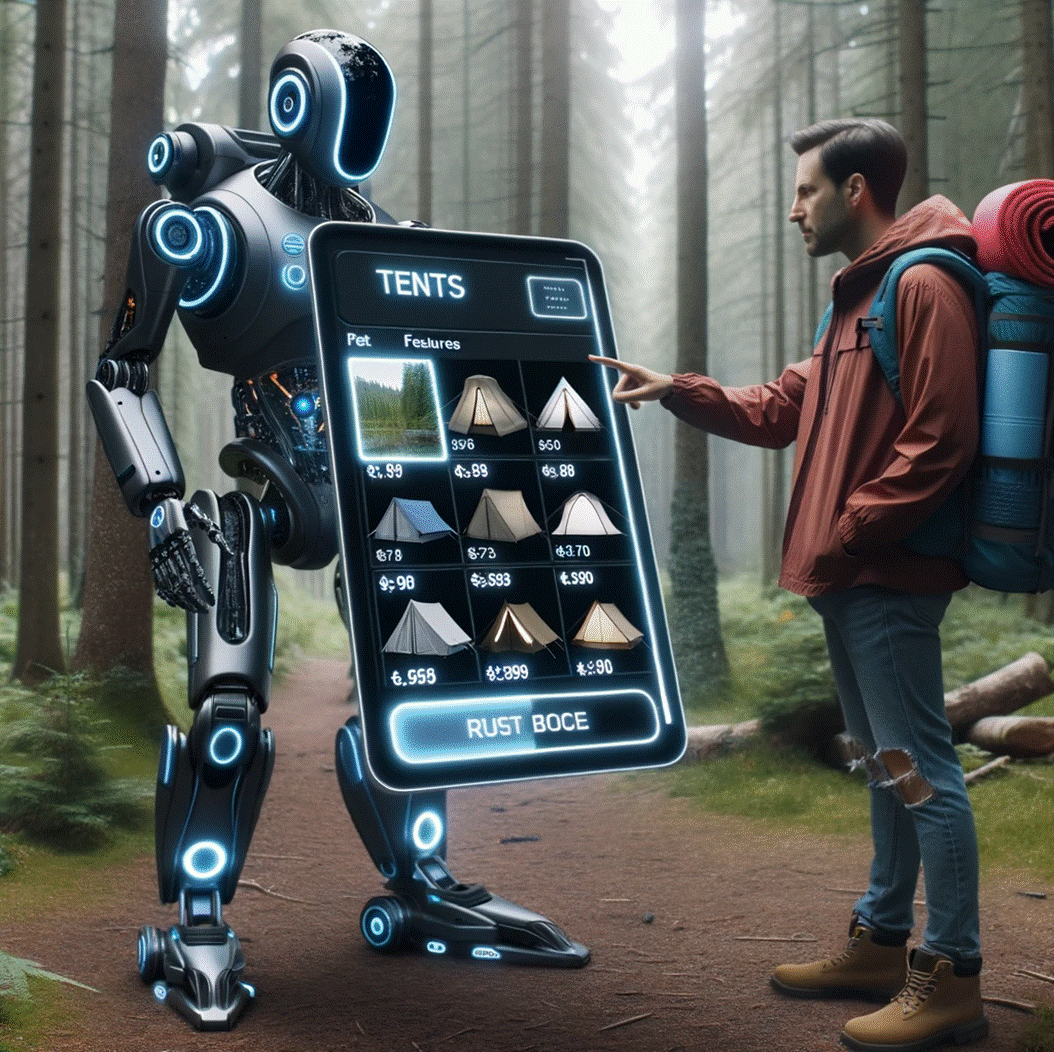Doubling the conversion to purchase is the dream of any online store. But how to achieve this is a big question 🙁 Turns out, there’s a surprisingly simple answer! You need to understand what a person needs and help them find it faster. If you adopt the approach of these startups, you can create your own platform — and start selling online stores their dream. And who wouldn’t buy a dream? 😉
Project Essence

Neocom assists online store visitors in finding the products they need more quickly and easily. In doing so, it aids store owners in converting website visitors into customers more efficiently.
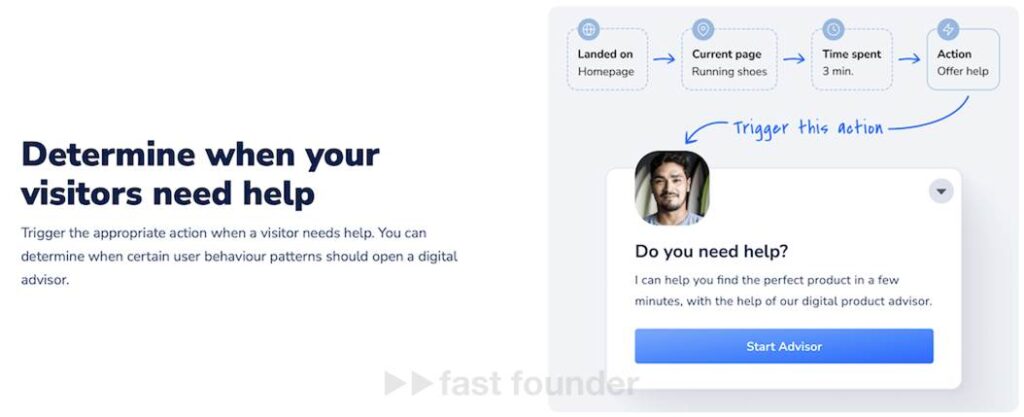
The platform’s unique feature is that it doesn’t annoy visitors with pesky windows, chats, and pop-ups that constantly ask or suggest something. It recognizes when a visitor is genuinely confused or facing a difficulty and only interacts with them at that moment.
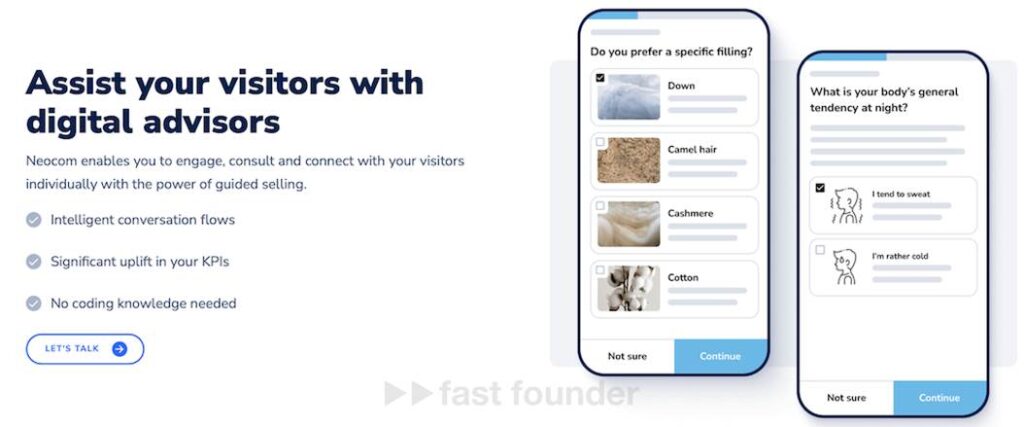
By this time, the platform has already analyzed the user’s path on the site and made its assumptions about what the person is looking for and where they got stuck. Therefore, its approach will be very specific and appropriate to the situation.
The so-called “digital consultants” of the platform engage with the user. For example, they might ask a visitor overwhelmed by an abundance of choices about their preferences. If someone is stuck in the blanket selection section, the consultant might ask, “Do you usually feel cold or sweaty at night?” or “Do you want a thinner or thicker blanket?”.
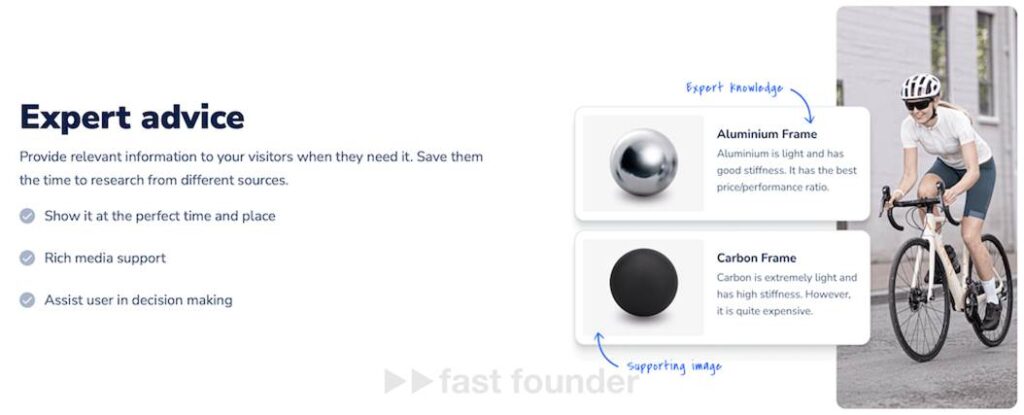
Consultants can not only ask questions but also provide expert advice. For instance, they can explain the differences between aluminum and carbon bicycle frames and which one is better for various types of rides.
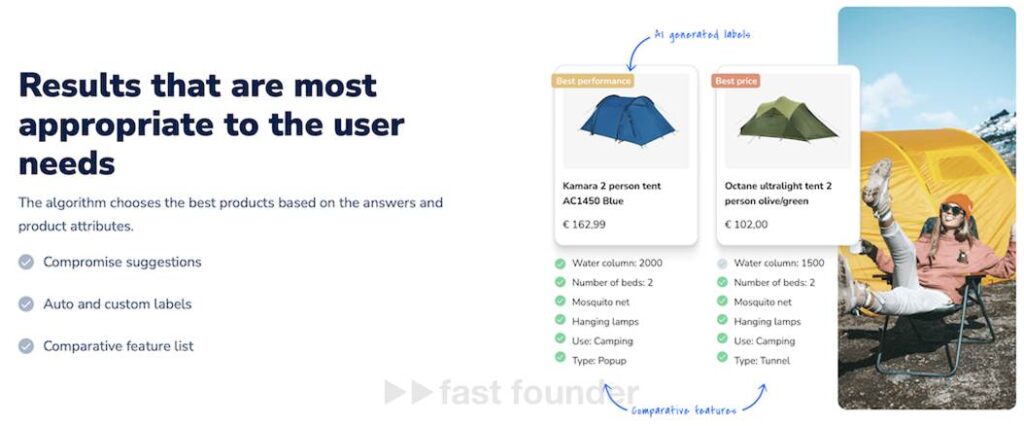
The platform’s primary goal is not to push a product onto a visitor but to help them find a product that best meets their needs and capabilities.
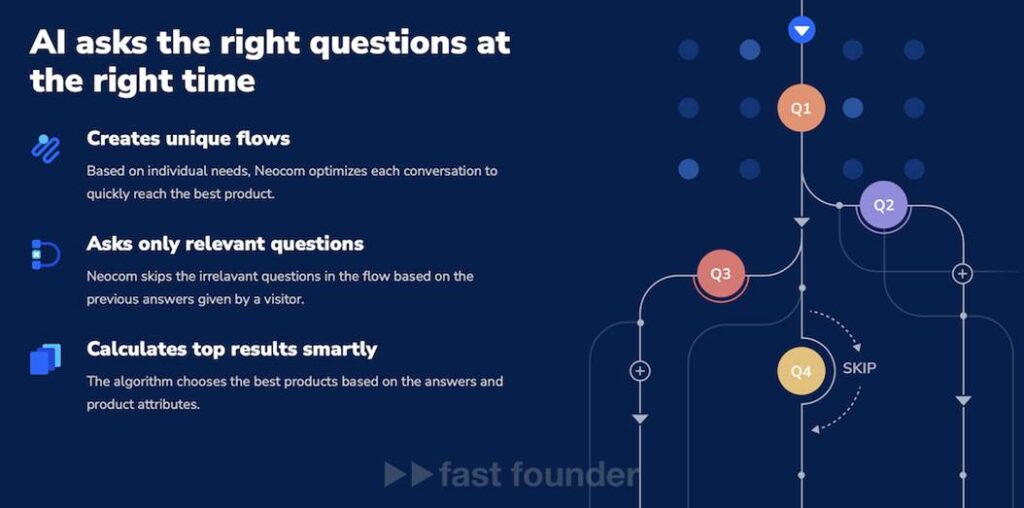
Naturally, underneath the platform’s hood is an AI engine that can a) identify hidden intentions of visitors based on their website journey, b) assume the reasons for their difficulties at each stage of each path, and c) formulate questions and advice that can help them overcome these challenges.
Digital Consultants Can Be Integrated Everywhere
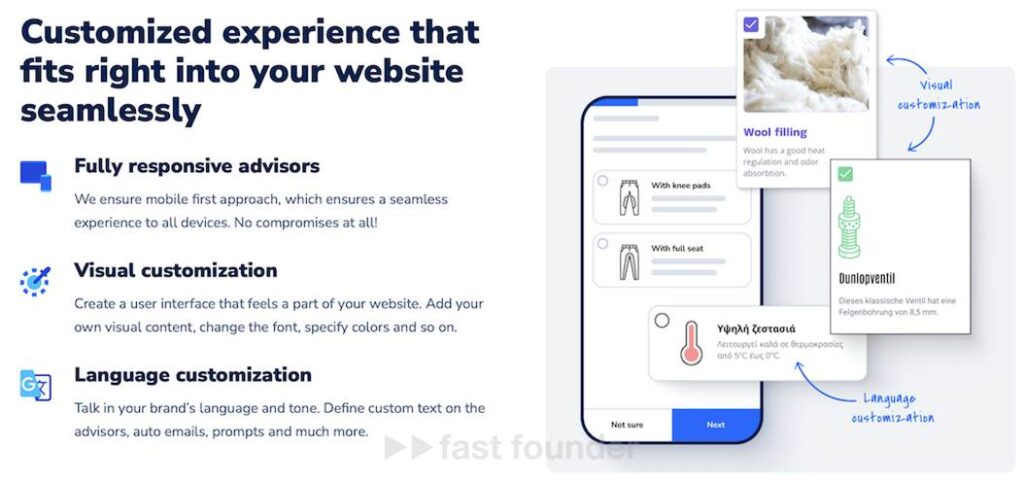
Digital consultants can be integrated into any website, and they’ll look equally good on any device, from phones to large monitors. The appearance of the consultant’s window can be adapted to match the design of the online store, and the style and tone of its interaction with users can be adjusted to whatever the store owner deems most suitable for their audience.
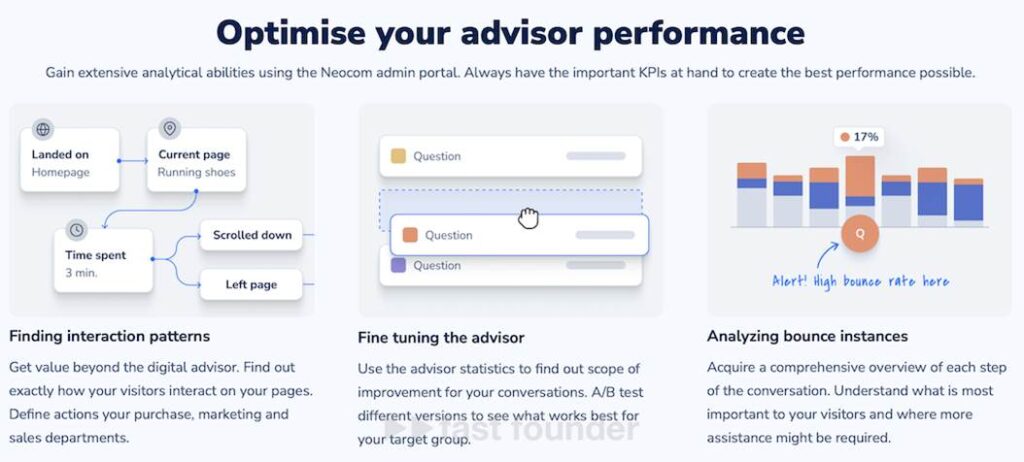
Store owners can monitor and optimize the performance of digital consultants by examining analytics of their interactions with visitors, adjusting the triggers that summon the consultant, modifying question lists, and conducting A/B tests to identify the platform’s most effective settings.

And it works! Stores that started using Neocom’s digital consultants have increased their conversion rate from visitor to buyer by more than twice, raised the average purchase value by 5%, and increased overall revenue by 11%.
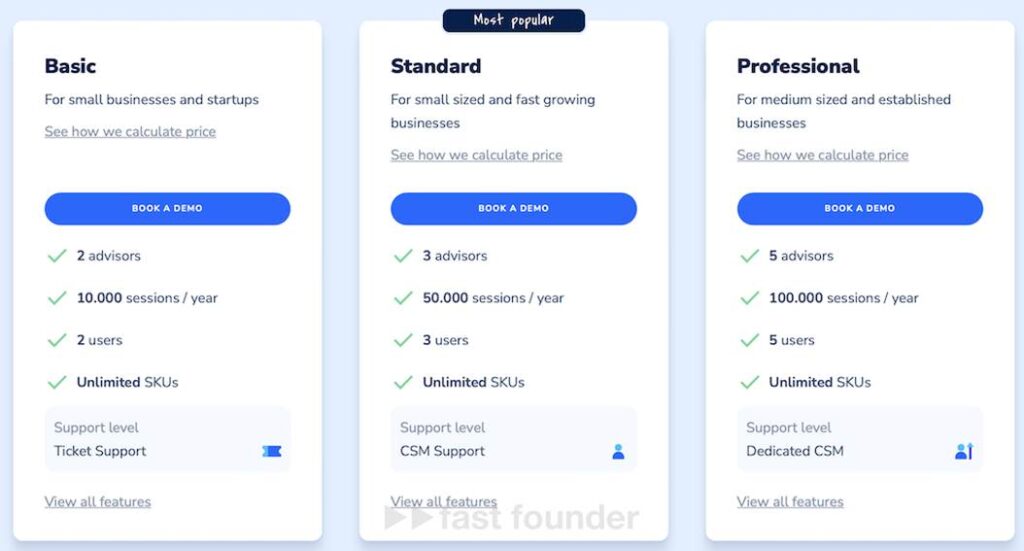
Neocom offers three tariff types to stores, but their prices can only be learned by registering for a demo version.

Neocom has real clients, some of whom are well-known manufacturers, such as Miele and Paulmann.
The startup has recently raised significant investments amounting to $4.29 million.
Interesting Insights
Two other startups are moving in a similar direction but from two opposite sides.

The first is Session AI. It has developed a platform that can guess, in no more than five clicks on a site, what a user wants to buy even if nothing is known about them. Session AI has raised $43 million in investments.
Notably, 90% of online store visitors are anonymous. Therefore, the store can’t offer anything based on their profile or purchase history, and they have to resort to platforms like Session AI.
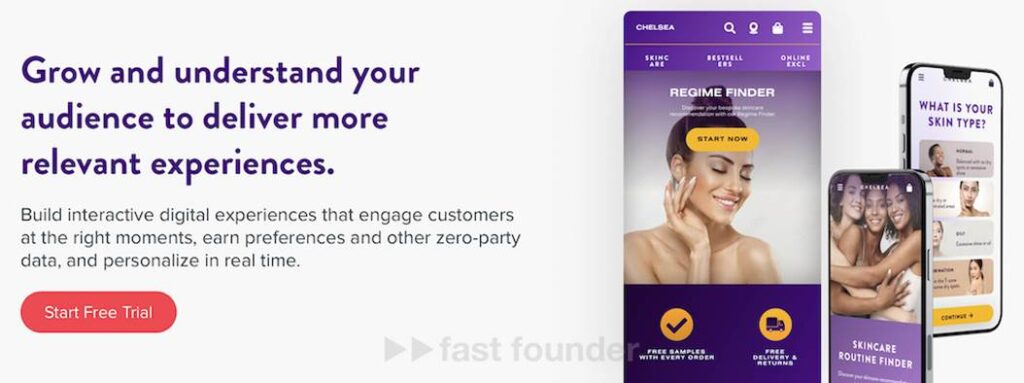
The second is Wyng. It has created a platform capable of asking online store visitors engaging and visually appealing questions to understand their profiles and preferences. This helps stores start recommending the most suitable products for them. Wyng has raised $37 million.
The general problem is that almost any site has products a visitor is explicitly looking for or that may suit them. But with so many different products available, visitors simply can’t quickly and easily find or choose what they need and leave after a few clicks.
And this isn’t a rare occurrence. Typically, the conversion rate from visitor to buyer in online stores doesn’t exceed a few percentages, meaning over 90% of visitors leave without selecting or buying anything.
If you can understand what a visitor is looking for or selecting and then quickly help them find it, you can significantly increase the conversion rate from visitor to buyer. As shown by the real results of the startups mentioned today, the conversion rate indeed increases by at least twice in this manner.
It’s an exciting point. Everyone is taught “sell better.” In simple terms, this usually means “learn to push any way you can” 🙁
A more accurate piece of advice isn’t “sell better,” but “understand better!” Try to understand what a person really wants, even if they haven’t explicitly articulated it, and help them find it.
And as we can see, it genuinely works! And what’s even more important – not just in the moment. Because only such an approach can bring loyal customers to a store who will return time and time again.
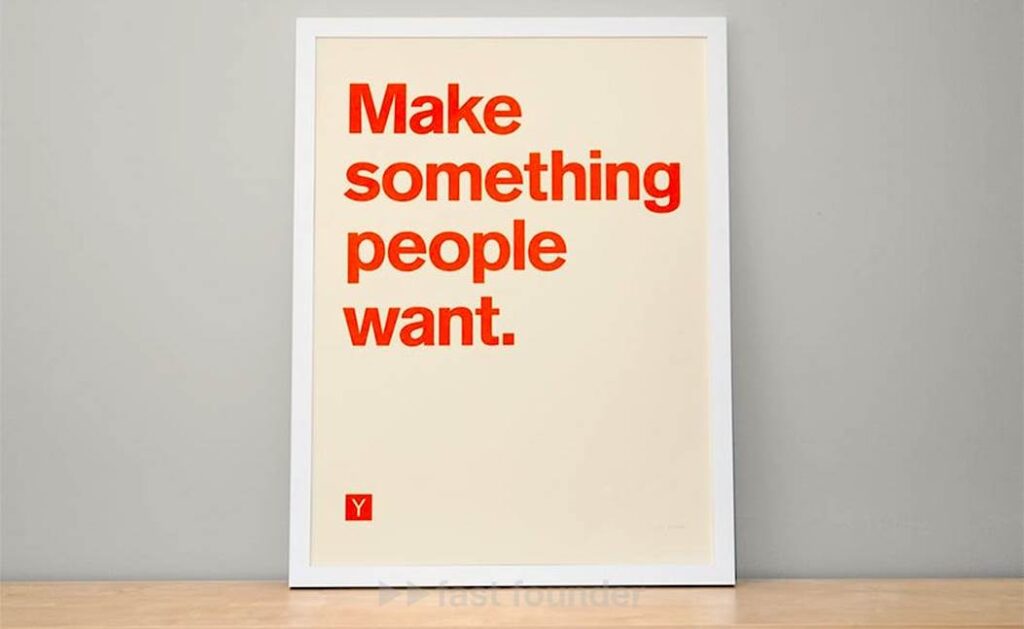
By the way, this works not only for stores but also for startups. Recall the motto of the most successful accelerator, Y Combinator: “Make something people want,” not “Sell better what you’ve made” 😉.
Where to Go Next
Understanding others is a rare skill. Humans are often clouded by their biases, beliefs, certainties, and prejudices, which affect their perception of others.
But AI has far fewer biases 😉. This makes it highly suitable for discerning the true desires and intentions of people, such as online shoppers.
The direction we’re heading towards is the creation of platforms that use AI to determine the intentions of visitors to sales websites (online stores, cloud services, etc.) and offer them the most relevant products and services.
Despite the simplicity of this approach, it’s not frequently employed. Plus, only now has AI started to enable this in the most effective way, by asking people fewer annoying questions at inopportune times. This suggests it’s the perfect time to create such platforms.
For inspiration, one can look to platforms like Neocom, Session AI, or Wyng, which were mentioned earlier.
However, these are not the only options and application areas for this approach. Where else and in what form could you suggest deploying this strategy?
About the Company
Neocom Website: neocom.ai
Latest Funding Round: $4.29M, 28.09.2023
Total Investments: Over $4.29M, Rounds: 2
